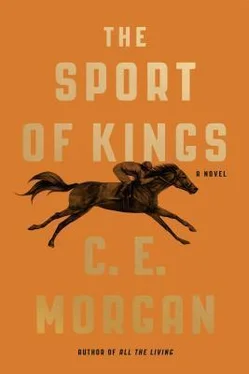The Reverend sighed through parted lips. He knew that the child didn’t know what he had meant, couldn’t understand the import. His chest clenched, nausea and exhaustion taking him over. Allmon held his gaze angrily and then two things happened: the Reverend closed his eyes in defeat, and Allmon seemed to understand he had won a victory at his grandfather’s expense, and the knowing filled him with shame. He immediately reached out and placed his hand on his grandfather’s chest and said, “Grandpa, you ain’t washed your hands and feet. You can’t go to bed all dirty.”
“Mmm-mmm…,” said the Reverend, as if he were trying to speak through lips that had been glued together. Then he rasped out, “I been tired … since … forever.”
“You got to get up and wash.”
But the Reverend didn’t reply, his brow creased, uncreased, creased and his left hand opened, closed, opened like a great bud trying to decide whether to bloom or not. The child was watching the changing weather of the man’s large face with a rapt attention. The face wasn’t paying him any mind now. He shouldn’t have said anything about his daddy, he felt almost sick about that now. “You mad at me, Grandpa?” he whispered.
With effort the Reverend said, “I ain’t … never been mad … a day in my life. No. The Lord, he just … been getting mad through me. He maketh the spirits his messenger … and a flame of fire his ministers.”
For a moment, there was silence. “I ain’t nothing…”
Allmon fought the urge to shake his shoulder. “You Damien Emerson Marshall.”
“… but a burning light,” he said.
“But—”
“Ain’t I said I pray ceaselessly?” he said upward with confused irritation.
“Don’t go nowhere,” said Allmon, though it was a silly thing to say; the man’s body was weighted down by a weight heavier than all the water in the river. The nausea was easing somewhat, but he was indescribably tired. He’d had pneumonia once in the long-ago past and this feeling was not unlike that. But that sickness had been almost pleasant. He had worked on a sugar-beet farm starting when he was eight, but when he got the bout of pneumonia his father, Paul, and his mother, Jenny, had put him to bed for two whole months and fed him garlic soup and raisin biscuits. That child — the child he had once been — rested for two months from his labors. And then the labors returned, and they never went away again.
The man’s mind was loose and roaming by the time Allmon returned to the room with a raggedy pink washcloth and a pan of water sudsy with Ivory soap. He moved as stealthily as a mouse, because he could detect motion behind the Reverend’s heavy lids, the obscure, private motions of his eyeballs. But the Reverend wasn’t asleep. He said, “Every day, Lord,” accusingly into the silence, as though that silence itself had dared to question him.
Allmon took up one listless, heavy hand, which had fallen over the edge of the bed. Allmon placed the warm, wrung washcloth over the hand, and the Reverend opened his eyes once and looked at the boy in blank curiosity; he didn’t even seem surprised, only watchful, and didn’t resist at all. Carefully, Allmon scrubbed the long fingers and the swollen knuckles, round and dark as buckeyes. Warm, wet across the palm to the wrist, which bore the striping of years in wrinkles. Then he placed that unresisting hand back on the bedspread and, picking up his pan of soapy water, circled round to the other side of the bed. He repeated his task on the Reverend’s left hand.
Through this the Reverend’s breathing was deep, calm, and even like the beat of an easy heart. His eyes opened and closed occasionally, but when his eyes were open, they were fixed on the ceiling cracks, crowded with black speckling mold.
When he was done with the left hand, Allmon climbed up on the bed on his hands and knees and untied the skinny black laces on the man’s dress shoes — he always wore dress shoes from Bakers — and pried them off his large feet with some effort, followed by the socks. His grandfather’s feet were startlingly ugly, with deep, flaky calluses all around the edges of them, the bony tops covered in risen veins like worms. His feet stank of vinegar, so Allmon tried to hold his breath as he scrubbed around the flaking heels, in between the toes and over the nails, which were ridged and thick and discolored. He noted the wiry gray hairs on the topsides of the knobby toes.
When he finished, he returned the rag to the water and eased himself slowly off the bed, so as not to disturb the man who had now fallen asleep, and he took up the tray in both hands. He crept out of the room, turning off the light with the tip of his nose. He considered saying good night, but didn’t.
Now he was tempted to be lazy and just leave the dirty water in the pan on the bathroom floor, but he expended the extra effort to empty the pan in the bathtub, where the water swirled darkly away. Then he walked down the hall to the kitchen, the bright lights reintroducing him to life. Two men were still sitting at the dining table, which was just a metal banquet table, probably a cast-off from the church basement. Allmon blinked in the fluorescence and held a hand to his brow, and he experienced the strangest feeling that he was just waking up, emerging from a deep and placid dream. The men seemed to look at him strangely, as if they’d never seen a kid before and didn’t know how to behave in the presence of one. They appeared almost shy, but Allmon wasn’t feeling shy himself. There was power in him tonight.
One of the men cleared his throat and said, “The Reverend all right?”
“Yeah.”
“You fixing to spend the night here, son?”
“Naw,” Allmon said, but he must have sounded hesitant, because the same man said, “How you getting home? Gonna take the Metro bus?”
“Yeah,” said Allmon, and made a move toward the parlor and the front of the old house.
“It’s dark. Let me walk you to the bus stop,” said the man, making a move to rise from his folding chair.
But Allmon felt beyond all that. He didn’t even look at the man as he moved past him, saying only three words: “I ain’t afraid.”
* * *
The next morning, when the Reverend did not appear at breakfast, one of the men in the house ventured into his room and found him there with his eyes half-open, a glass of water spilled over the red Bible on the nightstand. He had died of a heart attack sometime in the night.
When Marie heard the news, she sat for a long time on the plaid couch without moving, whipsawed, saying nothing with her blanched hands pressing down on her hair. Then she stood and with no tears in her eyes, said, “Now we got nothing. Now we really got nothing.”
* * *
She wouldn’t let him go to the funeral; she didn’t want him to see another body. So, lying on the old mattress alone, he made a list of who had left so far: (1) Daddy; (2) the Reverend; (3) Momma — she had gone off to the funeral but should have stayed, because he was still here, Allmon was still alive! A groundswell of original feeling surged upward from the very center of him, but he fought it with a clamping of his heart and pressed his palms to his cheeks until his face hurt. A headache formed along the tender contours of his skull, but he welcomed it. It was different from the Reverend dying, different from being abandoned. Still the Reverend rose up in the dim circlet of his pain and presented his stern, inscrutable face and his hand that opened and closed — now a bud, now a dark fist — and the ache set the child’s teeth on edge, and then Mike Shaughnessy’s pale face, all knife-cut angles, said, “I’m coming for you, because you are my son in whom I am well pleased.” Allmon’s heart finally gave in and, with abandon, he tasted the saccharine sweet of self-pity for the first time in his life, but without any sense of the bitter aftertaste to come.
Читать дальше
Конец ознакомительного отрывка
Купить книгу












